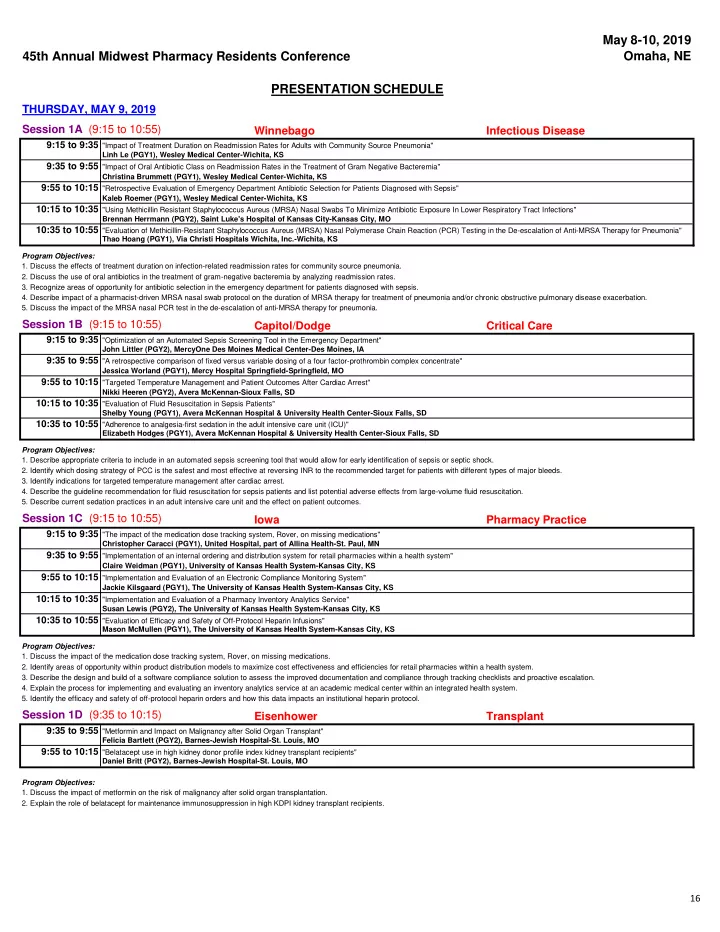

May 8-10, 2019 45th Annual Midwest Pharmacy Residents Conference Omaha, NE PRESENTATION SCHEDULE THURSDAY, MAY 9, 2019 Session 1A (9:15 to 10:55) Winnebago Infectious Disease 9:15 to 9:35 "Impact of Treatment Duration on Readmission Rates for Adults with Community Source Pneumonia" Linh Le (PGY1), Wesley Medical Center-Wichita, KS 9:35 to 9:55 "Impact of Oral Antibiotic Class on Readmission Rates in the Treatment of Gram Negative Bacteremia" Christina Brummett (PGY1), Wesley Medical Center-Wichita, KS 9:55 to 10:15 "Retrospective Evaluation of Emergency Department Antibiotic Selection for Patients Diagnosed with Sepsis" Kaleb Roemer (PGY1), Wesley Medical Center-Wichita, KS 10:15 to 10:35 "Using Methicillin Resistant Staphylococcus Aureus (MRSA) Nasal Swabs To Minimize Antibiotic Exposure In Lower Respiratory Tract Infections" Brennan Herrmann (PGY2), Saint Luke's Hospital of Kansas City-Kansas City, MO 10:35 to 10:55 "Evaluation of Methicillin-Resistant Staphylococcus Aureus (MRSA) Nasal Polymerase Chain Reaction (PCR) Testing in the De-escalation of Anti-MRSA Therapy for Pneumonia" Thao Hoang (PGY1), Via Christi Hospitals Wichita, Inc.-Wichita, KS Program Objectives: 1. Discuss the effects of treatment duration on infection-related readmission rates for community source pneumonia. 2. Discuss the use of oral antibiotics in the treatment of gram-negative bacteremia by analyzing readmission rates. 3. Recognize areas of opportunity for antibiotic selection in the emergency department for patients diagnosed with sepsis. 4. Describe impact of a pharmacist-driven MRSA nasal swab protocol on the duration of MRSA therapy for treatment of pneumonia and/or chronic obstructive pulmonary disease exacerbation. 5. Discuss the impact of the MRSA nasal PCR test in the de-escalation of anti-MRSA therapy for pneumonia. Session 1B (9:15 to 10:55) Capitol/Dodge Critical Care 9:15 to 9:35 "Optimization of an Automated Sepsis Screening Tool in the Emergency Department" John Littler (PGY2), MercyOne Des Moines Medical Center-Des Moines, IA 9:35 to 9:55 "A retrospective comparison of fixed versus variable dosing of a four factor-prothrombin complex concentrate" Jessica Worland (PGY1), Mercy Hospital Springfield-Springfield, MO 9:55 to 10:15 "Targeted Temperature Management and Patient Outcomes After Cardiac Arrest" Nikki Heeren (PGY2), Avera McKennan-Sioux Falls, SD 10:15 to 10:35 "Evaluation of Fluid Resuscitation in Sepsis Patients" Shelby Young (PGY1), Avera McKennan Hospital & University Health Center-Sioux Falls, SD 10:35 to 10:55 "Adherence to analgesia-first sedation in the adult intensive care unit (ICU)" Elizabeth Hodges (PGY1), Avera McKennan Hospital & University Health Center-Sioux Falls, SD Program Objectives: 1. Describe appropriate criteria to include in an automated sepsis screening tool that would allow for early identification of sepsis or septic shock. 2. Identify which dosing strategy of PCC is the safest and most effective at reversing INR to the recommended target for patients with different types of major bleeds. 3. Identify indications for targeted temperature management after cardiac arrest. 4. Describe the guideline recommendation for fluid resuscitation for sepsis patients and list potential adverse effects from large-volume fluid resuscitation. 5. Describe current sedation practices in an adult intensive care unit and the effect on patient outcomes. Session 1C (9:15 to 10:55) Iowa Pharmacy Practice 9:15 to 9:35 "The impact of the medication dose tracking system, Rover, on missing medications" Christopher Caracci (PGY1), United Hospital, part of Allina Health-St. Paul, MN 9:35 to 9:55 "Implementation of an internal ordering and distribution system for retail pharmacies within a health system" Claire Weidman (PGY1), University of Kansas Health System-Kansas City, KS 9:55 to 10:15 "Implementation and Evaluation of an Electronic Compliance Monitoring System" Jackie Kilsgaard (PGY1), The University of Kansas Health System-Kansas City, KS 10:15 to 10:35 "Implementation and Evaluation of a Pharmacy Inventory Analytics Service" Susan Lewis (PGY2), The University of Kansas Health System-Kansas City, KS 10:35 to 10:55 "Evaluation of Efficacy and Safety of Off-Protocol Heparin Infusions" Mason McMullen (PGY1), The University of Kansas Health System-Kansas City, KS Program Objectives: 1. Discuss the impact of the medication dose tracking system, Rover, on missing medications. 2. Identify areas of opportunity within product distribution models to maximize cost effectiveness and efficiencies for retail pharmacies within a health system. 3. Describe the design and build of a software compliance solution to assess the improved documentation and compliance through tracking checklists and proactive escalation. 4. Explain the process for implementing and evaluating an inventory analytics service at an academic medical center within an integrated health system. 5. Identify the efficacy and safety of off-protocol heparin orders and how this data impacts an institutional heparin protocol. Session 1D (9:35 to 10:15) Eisenhower Transplant 9:35 to 9:55 "Metformin and Impact on Malignancy after Solid Organ Transplant" Felicia Bartlett (PGY2), Barnes-Jewish Hospital-St. Louis, MO 9:55 to 10:15 "Belatacept use in high kidney donor profile index kidney transplant recipients" Daniel Britt (PGY2), Barnes-Jewish Hospital-St. Louis, MO Program Objectives: 1. Discuss the impact of metformin on the risk of malignancy after solid organ transplantation. 2. Explain the role of belatacept for maintenance immunosuppression in high KDPI kidney transplant recipients. 16
Recommend
More recommend